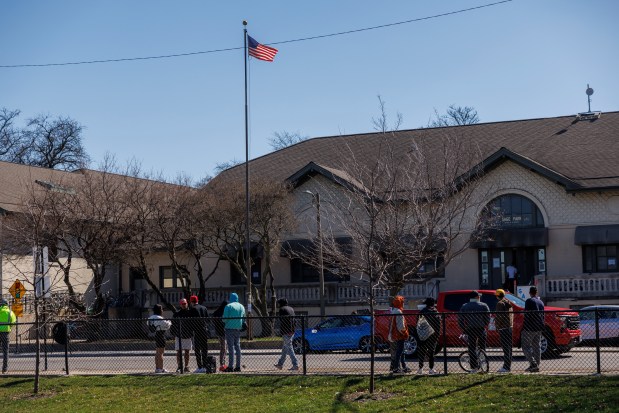More than two dozen migrants were set to be kicked out of shelters Sunday but the long-anticipated eviction only brought confusion and unanswered questions from the city.
City officials said of the 34 migrants who received notices to leave Sunday, only three exited the system. The remaining 31 adults scheduled for evictions received extensions due to exemptions. Four of the migrants were exempted because of disability and pregnancy and 27 were awaiting benefits for housing.
The adults were slated to be evicted from three different migrant shelters on March 17, following an announcement by city officials at a Friday briefing with reporters.
Ald. Andre Vasquez, 40th, said Sunday he hasn’t been provided any information by city officials about many migrants will be evicted out of which shelters in the next few days. As chair of the city’s Immigration Committee, he said having accurate census numbers is important to prevent homelessness and crime.
“What would you do? If you didn’t have a place to live or any means to survive?” he asked.
For months, Mayor Brandon Johnson has delayed enforcing his 60-day shelter limit policy, facing consternation from advocates who say thousands of migrants — many sent to Chicago on buses by Texas Gov. Greg Abbott — have few other housing options.
On Friday, his administration exempted about 4,500 migrants who were set to be evicted from the shelter system this spring. There are currently about 11,000 migrants staying in 23 shelters around the city.
Exemptions will be determined on a case-by-case basis for people with medical issues, those who are in the process of leaving Chicago, securing housing or who need to quarantine, according to officials. Pregnant women are exempt, and families with children can receive three 30-day extensions.
That leaves around 2,000 people — mostly men — to be evicted in waves by the end of April.
Officials say they are running out of money to house migrants. Cristina Pacione Zayas, Johnson’s deputy chief of staff said at last week’s briefing that the city is trying to slowly “decompress” three shelters in particular: the Woodlawn shelter at the former Wadsworth Elementary School, the Gage Park fieldhouse on the Southwest Side and a building on North Elston Avenue in West Town.
“These are some of our more expensive shelters to operate, and what we’re trying to do is optimize the resources that we have to be able to carry through,” she said.
To prepare for evictions, several volunteers set up a table outside the shelter in Woodlawn on Sunday. They stacked sandwiches wrapped in plastic and bags of toiletries, hoping to offer resources to migrants who had been kicked out.
No migrants had left by the 2 p.m. deadline city officials touted last week. Instead, migrants living at the shelter grabbed the food and donations en route to the laundromat around the corner. So volunteers packed up their table.
About a dozen men stood outside the shuttered school and shivered. They said they’d been told by staff that the shelter was closing soon.
“This is just the way life is for us,” said Moises Lopez, 21, when asked about the looming eviction notices. “The uncertainty. It’s not easy. There are many people who can’t work, and we don’t know what we’re going to do.”
Most migrants don’t qualify for work permit authorization, a permit that gives them the right to legally work in the United States. Advocates say not having the document is a large barrier to migrants’ autonomy and economic independence.
Having received thousands of new arrivals in the middle of winter, Johnson had previously delayed shelter stay limits three times. He cited inclement weather as a reason not to kick people out.
Jaime Groth Searle, founder of Southwest Collective said the administration has flip-flopped its policy so much that people aren’t prepared.
“It’s a little bit of a surprise when they are told,” she said. “Now they have to start all over again.”
Yorladis Reneteria, who stood outside the fieldhouse in Gage Park with her husband Aldo Reyes Sunday morning, said her eviction date wasn’t until April 30. Reneteria didn’t know of anyone inside who was leaving Sunday.
“The city keeps changing their mind. I don’t have kids, but I imagine it’s just that much more scary for the families that do,” she said.
Denver and New York have also received thousands of migrants in recent months and are adopting similar shelter limits, despite espousing welcoming values before Abbott’s busing program.
Chicago officials said migrants who are evicted can find their way back to the city’s “landing zone” in the West Loop, where they can reapply for the shelter system if they want a bed.
No migrant interviewed by the Tribune Sunday knew how to get to the landing zone, though they’d heard it was an option.
Chicago Tribune’s Alice Yin contributed.




